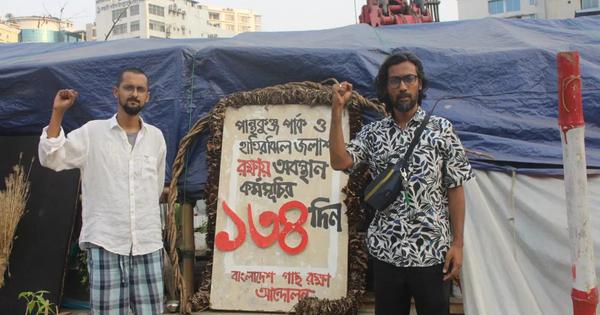It is day 137 of a round-the-clock sit-in to save Dhaka’s Panthakunja Park – aka “the pedestrians’‘ oasis”. Hundreds of trees have already gone and more are under threat due to plans for an elevated expressway across the Bangladeshi capital.
Green spaces in the city have shrunk from 17% in 1989 to 2% in 2020, driven by Dhaka’s rapid urbanisation, yet temperatures are on the rise – making shade a priority.
Hence the vigil, aimed at protecting urban nature – as well as sheltering street vendors, drivers and homeless people.
The road’s Chinese investors say they will rebuild the park after finishing their expressway but activists fear the harm to trees and wildlife would be irreparable.
Context spoke to Amirul Rajiv, an art historian and a lead coordinator of the Bangladesh Tree Protection Movement, who told us why the peoples’ protest started – and why it won’t stop.


It all began on the morning of December 14.
As we showed up to check on the Panthakunja Park where a ramp for a flyover was planned to be built, we saw truckloads of felled trees and plants being taken away. We were shocked – and rushed inside.
We found the nests and eggs of the park’s bird inhabitants scattered on the ground.
This park was a sort of sanctuary for birds – there were so many kites living on those trees. Then there were insects, frogs, dogs and many more eking out some living space at the centre of this busy city – which has been losing its green and water bodies very fast.
Now all we have left here are dozens of stumps of felled trees that had been giving us shade for decades and provided shelter for endangered urban wildlife.
The disregard for nature when new structures are planned and built in Dhaka is jarring given the dark, long shadow that the global climate crisis casts on climate-vulnerable Bangladesh – with growing heat, erratic rainfall and ever-more frequent disasters.
Our concern thus goes beyond this park. Large-scale development projects – like the construction of the metro rail and elevated expressway – have led to the felling of thousands of trees in recent years, affecting so many of our green spaces.


Earlier, as individual activists, we were pained by the loss of green and blue in the city – and we were making scattered protests here and there. But in 2023, we thought enough was enough and we needed to get our acts together.
We opened a WhatsApp group and added activists, environmentalists, and anyone who cares about nature and the city’s future – and thus set upon a new phase in our journey.
It is not just about trees, but about the ecology of an area consisting of not only people but also animals, birds and insects that share the city with us.
We wrote, we made art, we held cultural programmes to get our voices heard.
When we started the sit-in more than four months back, the local people – the rickshaw pullers, the women street vendors – would come up and whisper their support to our efforts to save this little resting spot for the poor at the intersection of traffic-congested roads.
We saw heat, we saw rain, we saw chilling cold over the last few months.
It has not been easy for us to fight for trees in various parts of the city. In fact, over the years, we faced threats and pressure from powerful groups that sought to grab green spaces.
Officials from Bangladesh’s interim government once visited and promised to sit with us and hear our concerns – but so far there has been no clarity on what is going to happen to the park.
The greenery as well as the human/non-human life should be at the very core of any plans and projects about the city.
This first-person account has been edited for length and clarity.
This article first appeared on Context, powered by the Thomson Reuters Foundation.

